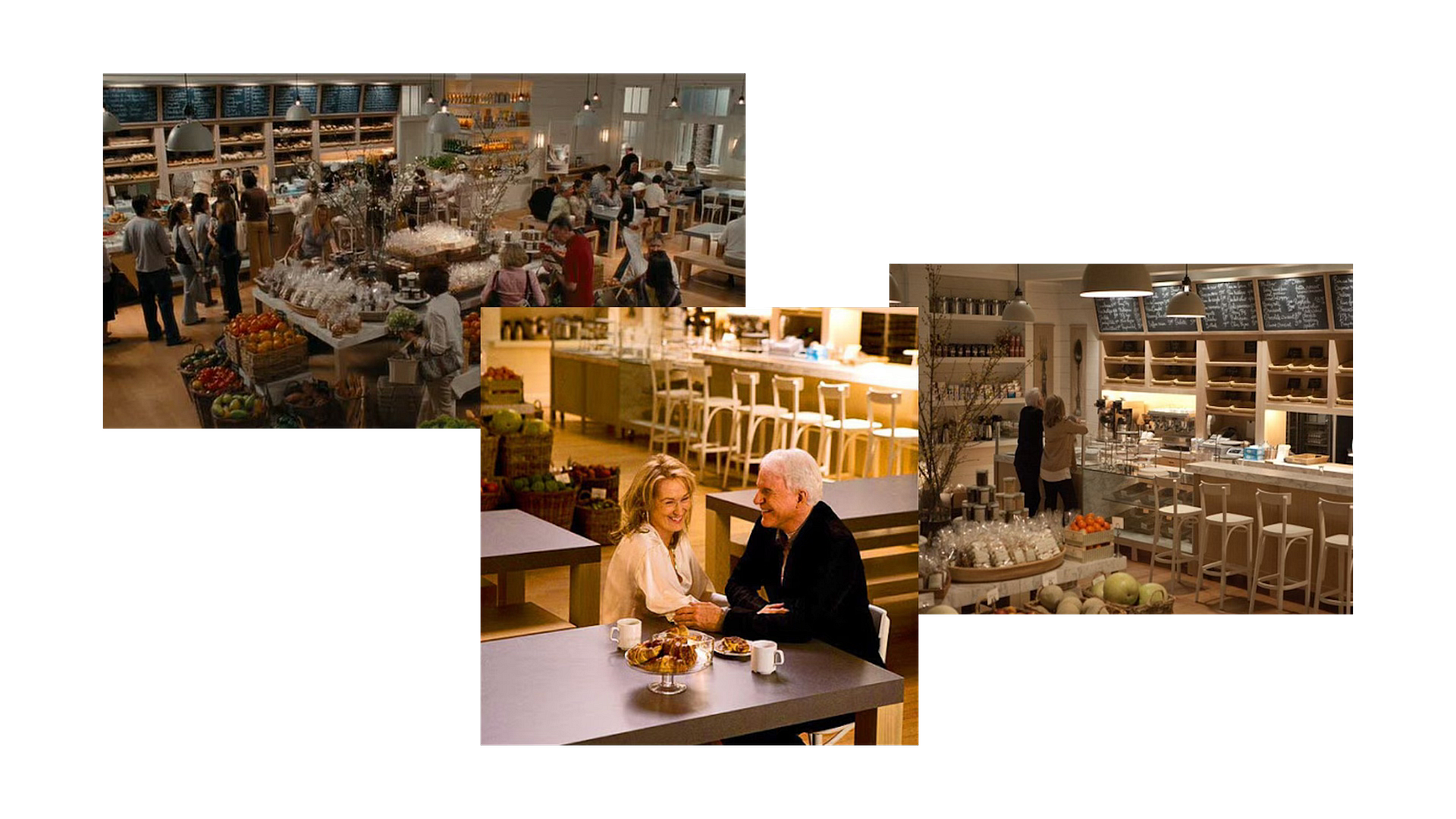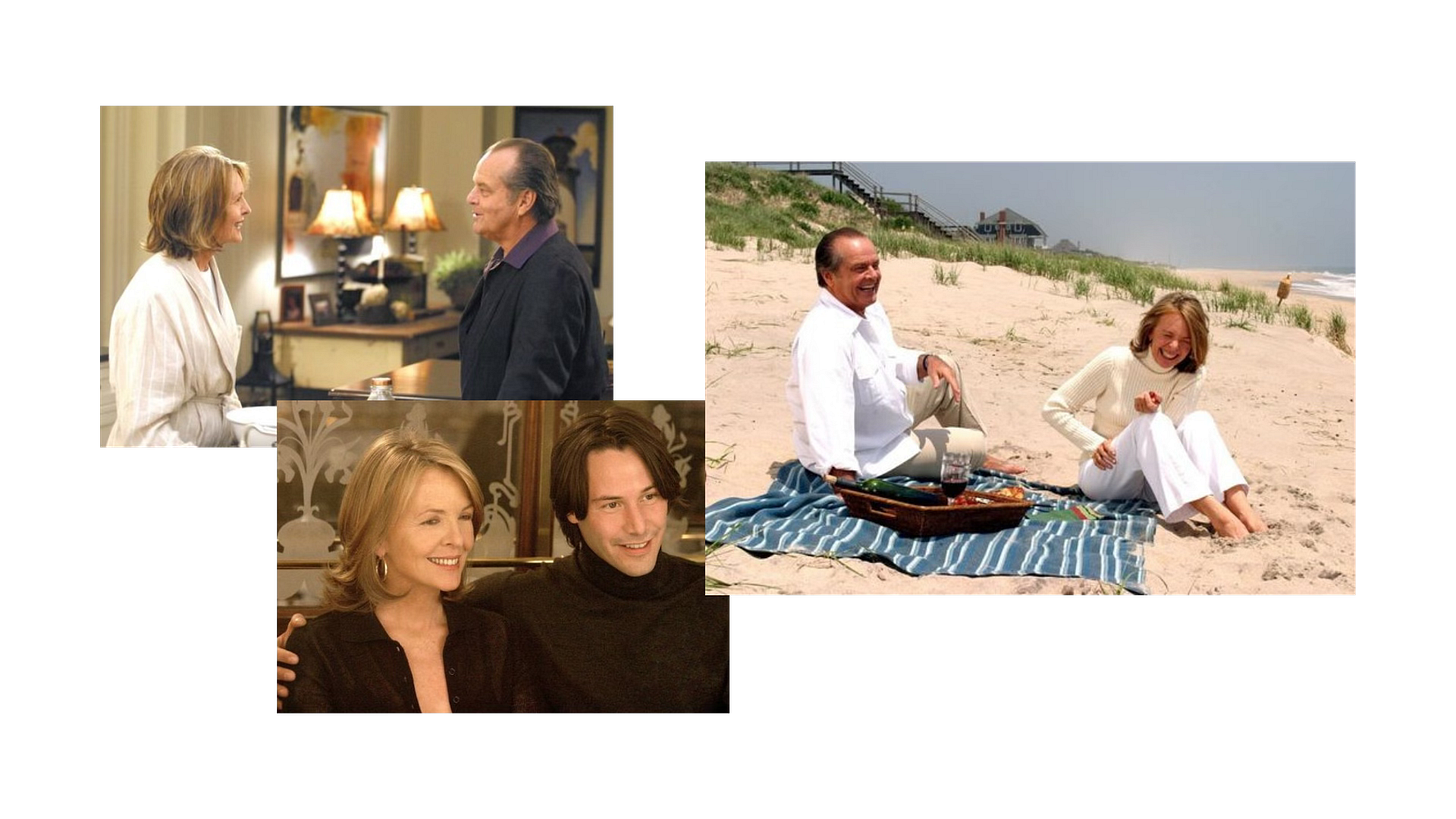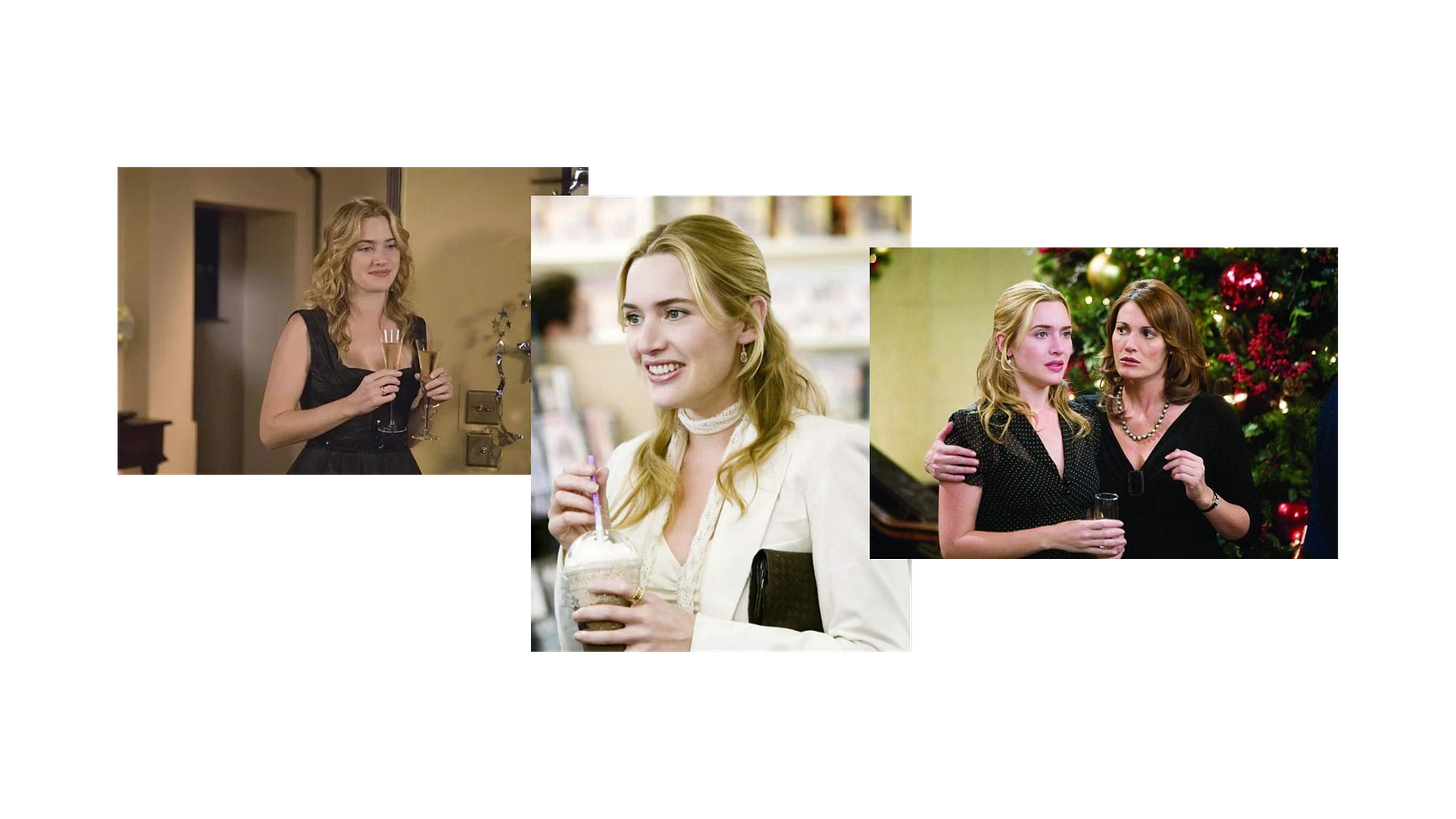It’s no secret that my life revolves around romantic comedies. Don’t get me wrong, I have an immense appreciation for other genres, but something about the humble romantic comedy feels like the sun on my back. I think it’s an underestimated genre: I’ve watched more than enough of them to know that so many aspects have to be perfect in order to avoid downfalls such as insincerity, cringe-worthy dialogue, distracting subplots and casting with zero chemistry. One person who executes the romantic comedy just about flawlessly is the legendary Nancy Meyers.
Her movies are unique in that they have swoon-worthy, heartfelt storylines without compromising on complexity. Meyers’ lead characters are powerful yet flawed and vulnerable women, her writing is full of wit, she can make us cry, and her ability to make the audience connect to her characters and stories is one of a kind.
This year I have seen so much content surrounding the “Nancy Meyers Aesthetic”. Often, this involves interior design inspiration, a lot of linen textures and coastal blue colour schemes, and chic white knit turtlenecks with a large basket bag. I acknowledge that the design in her movies is stunning: the textures, light, colour schemes, they’re all beautifully aspirational. It’s harmless content, and wonderful to appreciate this aspect of Meyers’ skill. Her sets act as an extension of her characters, they aid the story, and they’re exciting to see. However, part of it bothers me. Her movies are so much more than the way they look, and I also think that some of the ‘Nancy Meyers Aesthetic’ videos I’ve seen are pretty inaccurate and misinterpret what Meyers is trying to do.
Meyers herself isn’t overly keen on the trend, either. In an interview on the Talking Pictures podcast1, they discuss the fact that Meyers doesn’t like to talk about her “aesthetic” or interiors in interviews: ‘it gets a lot of attention and my name is used a lot in describing things now, and it just… it’s not me. I didn’t come up with a pair of white pants and a turtleneck, you know?’ As she speaks, I think she’s less frustrated that people like her design choices and more concerned that this new obsession might take away from what the movie has to offer:
‘I guess I did it in a couple movies in a row that they liked the way it looked… I don’t know. Hopefully they don’t buy a ticket to go and see that part of the movie, but I guess my point is a long way of saying I think I’m doing what other filmmakers have done that I admired, you know, where they’re giving you a complete package.’
So, in this piece, I thought I’d take a look at what it is that makes Meyers’ movies so special… aside from her interiors!
“You actually understood what I wanted.”
In one of the TikTok videos I saw demonstrating how to live like a Nancy Meyers character, the instructions were as follows:
Wake up slowly, make a coffee while playing jazz music
Go to the farmers market and pick up fresh flowers
Go antiquing
Come home and cook a roast chicken listening to Aretha Franklin
Sorry, what? I don’t think I’ve ever watched a Nancy Meyers film where the women have time to do this little in a day. Her characters are hard working women. Amanda owns a company that makes movie trailers. Iris is a journalist. Jules runs a fashion start-up. Jane owns a café. Erica is a playwright. Elizabeth is a fashion designer. As far as I’ve seen, none of these aesthetic videos take into consideration how hard these women work, and that step one to living your best Nancy Meyers life is to follow your passion and don’t let anyone get in your way. Do you think any of these women would get to live in their gorgeous houses with their dreamy kitchens by just lounging around looking at antiques all day? There isn’t a single Meyers character who is dependent on anyone other than herself. They are capable and strong-willed.
The character that always sticks out to me as someone who puts herself first is Jane Adler (Meryl Streep) in It’s Complicated. She shines so much more than any of the male characters in this movie. She owns her own successful bakery and cafe in California, and we soon learn that Jane’s passion is cooking, which is why she’s enlisted Adam (Steve Martin) to design the kitchen of her dreams. It’s clear that Jane’s kitchen is her sanctuary - food is how she shows her love for others. Dinner parties with her girlfriends, a wholesome meal for Jake (Alec Baldwin), chocolate croissants for Adam. I think Meyers designs the kitchens so beautifully in particular because they mean so much to the characters; it is the heart of so much of the action. Perhaps this is why I never hear anyone talk about having a ‘Nancy Meyers bathroom’.
The other character whose career is fascinating to see is Amanda (Cameron Diaz) in The Holiday. After she’s been heckled by her ex for being a workaholic who has had a cutting room installed in her home (ironic considering how working from home is such a big thing these days, Amanda was just ahead of her time), we see her at work, and she’s a natural. She’s an effortless leader, she knows what she’s doing, and she’s driven. What’s more - she understands and acknowledges how talented she is - “and that’s why they pay me the big bucks”.
All of Meyers’ characters are career women - they do not need to depend on anyone else to support them. They are financially stable and independent. I love seeing this on screen, and I love how it’s not a big deal. It’s not like Meyers is making these women successful as part of a box-ticking exercise to ensure she’s writing a Strong Female Character, it’s just who they are, because that’s the way most women are. They aren’t anomalies.
“When something happens to you that hasn’t happened before, don’t you at least have to find out what it is?”
Meyers is an expert at writing vulnerable women who do not fall into the category of ‘damsel in distress’. They do not need saving, they are merely allowing themselves to feel. They will pick themselves back up when they are ready.
Erica (Diane Keaton) in Something’s Gotta Give is relatively inward, but she’s willing to open herself up to the opportunity for love when she meets Julian (Keanu Reeves), and despite the fact that she is reluctant to open up to Harry (Jack Nicholson), when she does she does so freely. Erica is wary, but her strength is propelled forward through her willingness to be vulnerable. She is well aware of the risks that come with emotional intimacy; following through despite these anxieties mean we see significant character growth from her.
Meyers frequently follows this pattern, depicting women who are a little tentative when it comes to opening themselves up to love again, however will do so fearlessly because they realise that it’s better to be scared and to love than to never love at all.
I think this is an attitude that can be adopted to so many things, not just romance, and we can learn from it. Even if something doesn’t work out the way you’d hoped, the message we get from Meyers’ screenplays is that having the experience will always be beneficial in some way. I mean, Erica wrote a whole play script based on her experience. I’m also 90% sure I read somewhere that Meyers based the relationship between Jasper and Iris in The Holiday on something she was experiencing at the time. If you find yourself allowing vulnerability to take the wheel, don’t forget to turn it into a Christmas classic for the rest of us to enjoy.
“I’ve got a life to start living - and you’re not going to be in it!”
More than anything, the feeling I get after I watch a Nancy Meyers film is the urge to get my life together. We see these women go on such an emotional journey, they grow through pain and create something wonderful from it. I think that’s why there’s so much emphasis on Nancy Meyers as an aesthetic, we want to replicate the feeling of the journey these women are experiencing in the movies and choose to do that through styling, but I think this could be way more effective if we actually implement the ways in which Meyers’ female characters go about their emotional transformations.
It would be wrong for me to use anyone other than Iris (Kate Winslet) from The Holiday for this example. Nobody glows up in the same way that she does. I touched on Iris in The Rom-Com Is A State Of Mind, but essentially, when we meet her she is at rock-bottom. She finds out that the man she’s been in love with for years is engaged to someone else. She doesn’t feel as though life is worth living anymore, she’s beside herself with devastation. In a serendipitous moment, Amanda sends her a message and they follow through with the house swap which sees Iris jet off to LA for two weeks. In this time, she blossoms. She frees herself from the cage that unrequited love has trapped her inside, and creates a new life.
Iris knocks on her new neighbour’s door and befriends him. In helping him, she helps herself. You know the scene where they go swimming to help get his mobility back? I always think that must be such a nice way to take care of your physical health, imagine waking up in LA and going for a morning swim in your pool. That must be lush. Unfortunately it’s pitch black and bitterly cold in the mornings in the UK so I tend to opt for a 30 minute HIIT session in my living room. Whatever floats your boat.
She also befriends Miles (Jack Black) almost by accident. What Meyers does so well with Iris is she creates her into a character who is willing to say yes, to go along for fettuccine at a moment’s notice, to invite Miles in when they’re having a Hanukkah party, to ask Arthur for dinner on her first night there. I adopted this recently in my own life, and I have reaped the benefits. I think a lot of us are inclined to stay in and keep ourselves to ourselves; the world doesn’t seem particularly open to making new friends these days. It takes a great deal of effort. Making these changes is pretty straight-forward, but it’s so beneficial.
My Mum has a Nancy Meyers kitchen. It’s beautiful. A marble worktop, rich navy and stone painted cupboards, limestone floors, French doors looking out at the trees. In the evening, it glows with warm lamp light as herbal teas are brewed in oversized, hand-painted mugs. There’s always a bouquet of seasonal flowers sat on the dining table. She knows how lucky she is to have a kitchen like that.
The kitchen doesn’t solve problems, though. It doesn’t comfort us after a long, hard day. We do that for ourselves. You don’t need a coastal colour scheme and linen trousers to adopt a little Nancy Meyers magic into your own life. I feel like what we’re trying to embody by designing our homes and personal style around Nancy Meyers’ movies isn’t just the general aesthetic, but the cosy feeling we get when we watch them.
Life cannot be reduced to an aesthetic, and I think this is what Meyers does so well. Yes, her films are easy on the eye, but they don’t shy away from the complexities of life. She makes it clear from the get-go that her characters are multi-dimensional.
When we meet Iris, she is deeply heartbroken. Depressed, burnt out, and a victim of unrequited love. Not even her beautiful cottage saves her from sadness. In The Intern, Jules’ relationship is suffering because of her busy workload. Spoiler alert - it’s not her Brooklyn townhouse that remedies it!
Meyers writes authentic, flawed women, which is part of the reason why we love them so much. They aren’t cookie-cutter Hallmark perfection: they scream, they cry, they love fearlessly. Seeing women written this way is reassuring because they are representative of so many of us. Meyers’ characters give us permission to take risks, to learn from our mistakes, and to get it wrong all together.
To romanticise a Nancy Meyers movie is to void it of its feeling. It’s already romantic. If that’s all we take from the film, then Meyers should stop making movies and start making coffee table books. That’s not what we want, though. By all means embrace the Nancy Meyers aesthetic, I do! Just remember there is more to Nancy Meyers than her kitchens, and there is more to you too. It’s less what the kitchen looks like, and more the memories you make in it.
“Nancy Meyers”, Talking Pictures, 16 Jan 2023.












LOVED this. The Nancy Meyers aesthetics trend always rubbed me the wrong way but I could never pinpoint as to why. This essay puts it perfectly: The kitchen decor does not solve any of the problems, the women do it themselves!
"All of Meyers’ characters are career women - they do not need to depend on anyone else to support them. They are financially stable and independent. I love seeing this on screen, and I love how it’s not a big deal." YASSSSS!!! 👏🏻👏🏻👏🏻 I have thought this SO often; the 'Nancy Myers' TikTok aesthetic is missing the entire point of her characters??? They are mostly badass WOMEN OF THE CORPORATE LADDER, baby. Pay respect!!
Another glorious post. 👏🏻